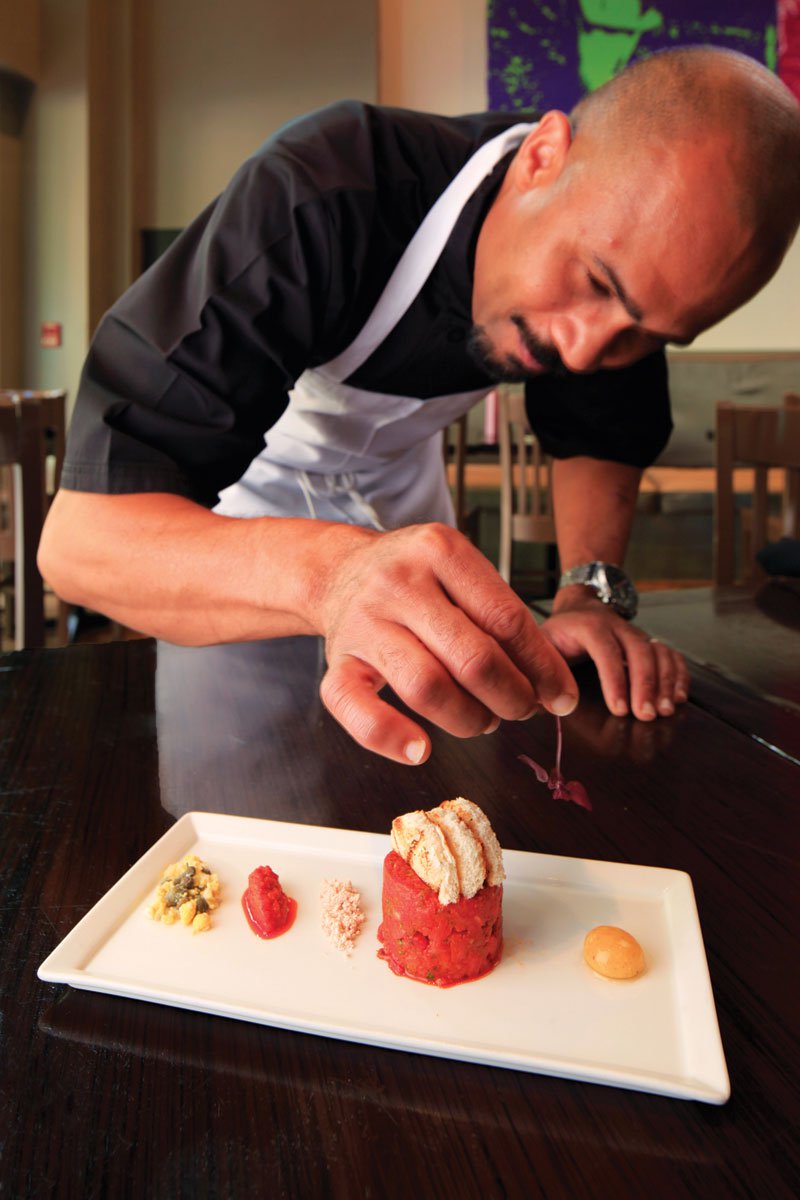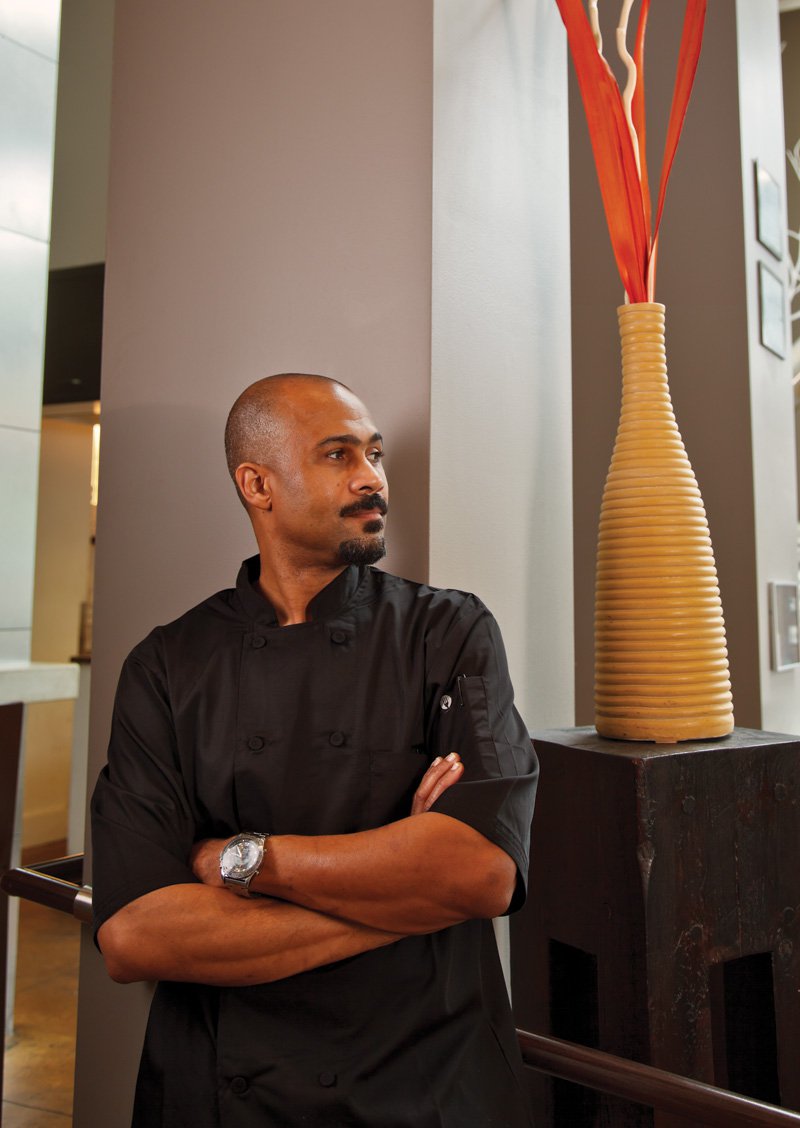Chef Morou Ouattara has carved a niche for himself in the upscale D.C. restaurant market and continues to expand his culinary turf.

Ouattara’s place each element in its own spotlight on the plate.

Ouattara’s byword is deconstruction.
photography by Roger Foley
It’s a busy September afternoon at Kora, an Italian restaurant in Arlington’s Crystal City. Big parties will be taking over the dining room in a couple of hours, and owner Chef Morou Ouattara is fidgeting anxiously.
It’s amazing that a chef of Ouattara’s stature would have tingling nerves. He’s been in the national spotlight more than once. In 2005, he went head to head with star chef Bobby Flay on national TV on “Iron Chef.” (He got Flay-ed.) He found himself in the limelight again in 2007 with another go before a national audience, this time on “The Next Iron Chef.” (He made it to episode 3.) In between, he owned or worked at D.C.-area restaurants—some higher profile than others—and he’s received mostly plum notices ever since. But Ouattara, 46, is a perfectionist. And while many of his ilk would consider a journalist’s visit an intrusion, he is exceedingly charming and gracious if, perhaps, a soupçon distracted. “You know. It’s, well, you know,” he says, rubbing his hands together, unable to hide the fact that he’s itching to get back to work.
Ouattara runs at high velocity most of the time, a pace he mastered when, in one six-month stretch, he closed a restaurant, launched a line of African spices and opened another restaurant.
His first restaurant, Farrah Olivia (opened in 2006 and named for his oldest daughter) in Old Town Alexandria, featured American-African fusion cuisine and earned notices and a following for its bold inventiveness. But the venture closed in April 2009 after only three years due to lease issues with the property owner. Within four months of closing Farrah Olivia, Ouattara opened Kora in Crystal City. And somewhere before year’s end, he refined the spice line for retail sales.
Apparently, running one restaurant isn’t enough to hold the attention of a Type A chef, because early in 2011, he re-launched the more upscale Farrah Olivia, now a small, exclusive dining room inside Kora, with its own menu and towering ceilings that keep its scant seven tables from becoming too intimate for strangers.
Ouattara’s penetration of the Metro D.C. restaurant scene had fairly unique beginnings. One of 33 children born to a successful entrepreneur and his four concurrent wives in Côte d’Ivoire, (he was the fourth of 11 born to his Lebanese mother), Ouattara grew up in a compound. Not as privileged as it might sound, he says. Was there a large staff? “With 33 kids? Do you think we needed it?” he asks. He isn’t looking to replicate his origins. “Here, it’s hard to take care of one person,” he laughs. He and his wife Heather have three daughters: 8-year-old Farrah Olivia, 6-year-old Kora and 2-year-old Lily.
One has to be a workaholic to lead a kitchen serving two dining rooms at once. And Ouattara is, hence his mild anxiety over a soon-to-be full house. He is known to go for more than three years without a vacation. When Lily was born (fortuitously in the wee hours), he came late to work, but he didn’t miss dinner service. “I came in in the afternoon,” he says.
Ouattara’s path to becoming a celebrated chef was truly indirect. He followed a brother (an exchange student) to America in 1988 to study computer science at the University of the District of Columbia. Somehow, (“I fell into it,” he says), he wound up washing dishes at I’Ricchi, an Italian restaurant in D.C. Within 18 months, he was working the line as sauté chef. Over three years, he worked his way up the line until he caught the eye of celeb chef Mark Miller, owner of the now-closed Red Sage in D.C., who hired him and eventually elevated him to executive chef. There, working with a Southwestern-inspired menu, Ouattara says, “I realized that Native American cuisine is like where I’m from—smoked meats, corn and root vegetables.” More importantly, he says, “I learned how you can fuse a couple of cuisines.” And that was the first step on the path that would beget Farrah Olivia.
From Red Sage, his reputation continued to grow, save for one stumble: While Ouattara was executive chef at Signatures, outlaw lobbyist Jack Abramoff reportedly used his ownership of the restaurant to entertain political influentials. After the scandal broke in 2005, supporters scattered. But, following a short break, Ouattara bounced back with the first Farrah Olivia, where his upbringing began to inform his creativity.
Ouattara describes his signature cuisine as “half African,” flavored with spices like alligator peppers and egusi, and cooked for American tastes. What, exactly, does that mean? In a word, deconstruction.
In Ouattara’s native part of Africa, he says, stews take center stage. Not so here. Americans order protein first and foremost. Says Ouattara: “Everything else is a side. So I take [the protein ingredient] out of the stew and cook it separately. I take the dish, pull it apart, and reconstruct it the way Americans eat.”
Using Ouattara’s approach, instead of melding in a thick stew, each element of a dish stands alone against the backdrop of a blank, white plate. The tip end of a braised beef spring roll, for instance, is the spotlight of a “pre-appetizer” with a small dollop of sweet chili sauce. Shocked white tuna presents as four bite-sized pieces of seared tuna with delicate dots of Kalamata pearls, pickled cucumber and wasabi aioli, each occupying its own place in an artfully designed presentation. Equally beautiful, his Tandoori spiced salmon comes with a streak of crunchy fermented yucca couscous.
And all are delicious.
For now, Ouattara is contentedly busy, finding enough challenge in running two restaurants, a bustling kitchen and a mammoth staff. That doesn’t mean those will always be enough for the driven chef, restaurateur, father and husband.
Will there be a restaurant named Lily in his future? The mere suggestion starts him fidgeting again. “Maybe,” he says. “Not right away.”
KoraRestaurant.com










